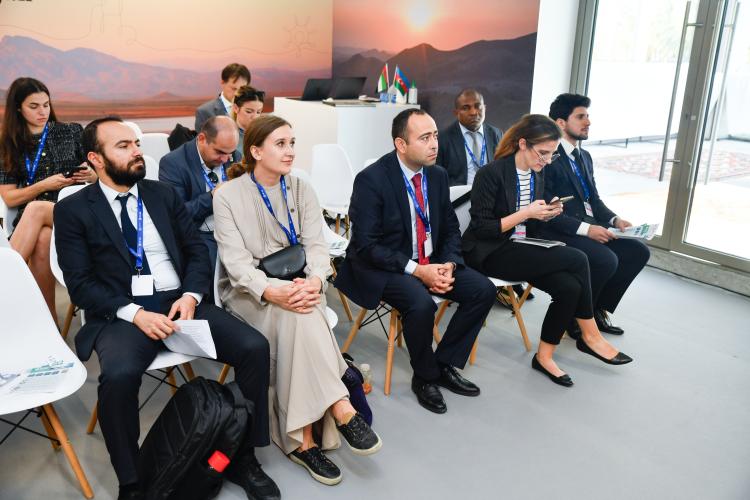The Side-Event "Country Efforts in Transitioning towards ETF: Learning from the National and Global CBIT projects in Eurasia and the Caucasus" was held on December 5th, 2023 in Azerbaijan Pavilion, COP-28, Dubai, the UAE.
The main objective of this side-event was to present the country-based progress on climate transparency in Eurasia and the Caucasus via support received from national and global CBIT projects and share lessons learned from their journey towards ETF.
Key take-away messages from the Side-event are:
- GEF supports the countries in their efforts towards establishing the lean transparency systems through the Initiative on Capacity Building for Transparency (National CBIT projects), Enabling Activities to report under the UNFCCC (National Communications/Biennial Update Reports and Biennial Transparency Reports), and through the global CBIT-GSP project. The countries are welcome to use this opportunity to accessing GEF funds and requesting the support based on their national priorities for capacity building. Those countries which have already completed their first national CBIT projects can apply for the second phase of the project.
- National and global CBIT projects play a critical role in enhancing the institutional arrangements for transparency, building the technical capacities of local experts and providing a solid platform for development of the first BTRs. Supporting the national governments to draft legal and normative frameworks for climate transparency, refining the national GHG Inventory and improving the quality of data, capacitating the local experts to report under the Article 13 are among a few common elements for the national CBIT projects.
- The countries made a good progress in achieving the project objectives. However, the common challenges are: a high turnover of the governmental staff, limited understanding of new reporting requirements under the Article 13 of the Paris Agreement by decision makers and sustainability of the project achievements. To overcome these challenges, the countries are doing their best to train young and junior specialists, institutionalize the climate policy actions, engage with municipalities on accessing the on-site data, improve the reporting channels, and implement the mitigation actions at the level of a sub-district.
- One of the main challenges however is still associated with reliance on external resources. There is a recognition that the allocation of state budget for climate reporting and transparency is very important for a smooth transition from a project-based process to a more sustainable system on transparency. There are some efforts in introducing the tools and approaches for climate finance budgeting and tracking but it will take time to assess its effectiveness and practicality.
- The synergy and complementarity of the national CBIT projects is well assured by other initiatives on climate change at the national level. For example, the projects on NAP development, Climate Promise and global CBIT-GSP were recognized as main contributors to achieve the significant results on formulating the climate policies and establishing the M&E and MRV systems to track the national mitigation and adaptation measures.
- All the countries recognized that the exchange on transparency efforts within the established regional networks of the CBIT-GSP is very important for mutual learning and capacity building. The countries welcomed the idea of sharing best practices and success stories on the national CBIT projects, which have already been completed with other countries and networks, through the global CBIT-GSP platform.
About the Side-event:
The Enhanced Transparency Framework (ETF) is the backbone of the implementation of the Paris Agreement on Climate Change, as defined in its Article 13, and it is the internationally-agreed mechanism to monitor the progress of the Nationally Determined Contributions (NDCs). The Global Environment Facility supports developing countries in building their institutional and technical capacities to meet the requirements of the ETF through: (i) Capacity Building Initiatives for Transparency at the global and national level via UN implementing agencies in the face of UNDP, UNEP and FAO, (ii) Support for reporting obligations under the Convention, i.e., National Communications (NCs) and Biennial Transparency Reports (BTRs); and (iii) Global support for the ETF.
At the global level, GEF supports the Capacity Building Initiative for Transparency – Global Support Programme (CBIT-GSP), implemented by UNEP and executed by UNEP-CCC. This global project coupled with the support provided by the national CBIT projects and enabling activities on NC and BTRs, aim to strengthen national institutions for transparency-related activities in line with national priorities, to provide relevant tools, training, and assistance for meeting the provisions stipulated in Article 13 of the Agreement as well as to assist in the improvement of transparency over time.
At the national level, the similar projects on capacity building for transparency are implemented by various implementing agencies. For example, the “Capacity Building for Azerbaijan to Meet the Paris Agreement's Enhanced Transparency Framework” aims to enhance Azerbaijan's capacity to implement the Paris Agreement and the “Azerbaijan: Enabling Activities for the Preparation of the Third Biennial Update Report (BUR3) under the United Nations Framework Convention on Climate Change (UNFCCC)”, being funded by GEF is implemented via UNEP and executed by the Azerbaijan Branch of the Regional Environmental Centre for the Caucasus (RECC). The main project beneficiary is the Ministry of Ecology and Natural Resources (MENR).
Since many of the countries implement or plan to implement their national CBIT projects and are part of the global CBIT-GSP, it is intended to bring them together and showcase the example of the transparency progress of the Eurasian and the Caucasian regional networks. The side-event is jointly organized by CBIT-GSP and the Regional Environmental Centre for the Caucasus (RECC) in Azerbaijan Pavilion of the Conference of the Parties COP-28, which will be held from November 30th until December 12th 2023 in Dubai, United Arab Emirates.
